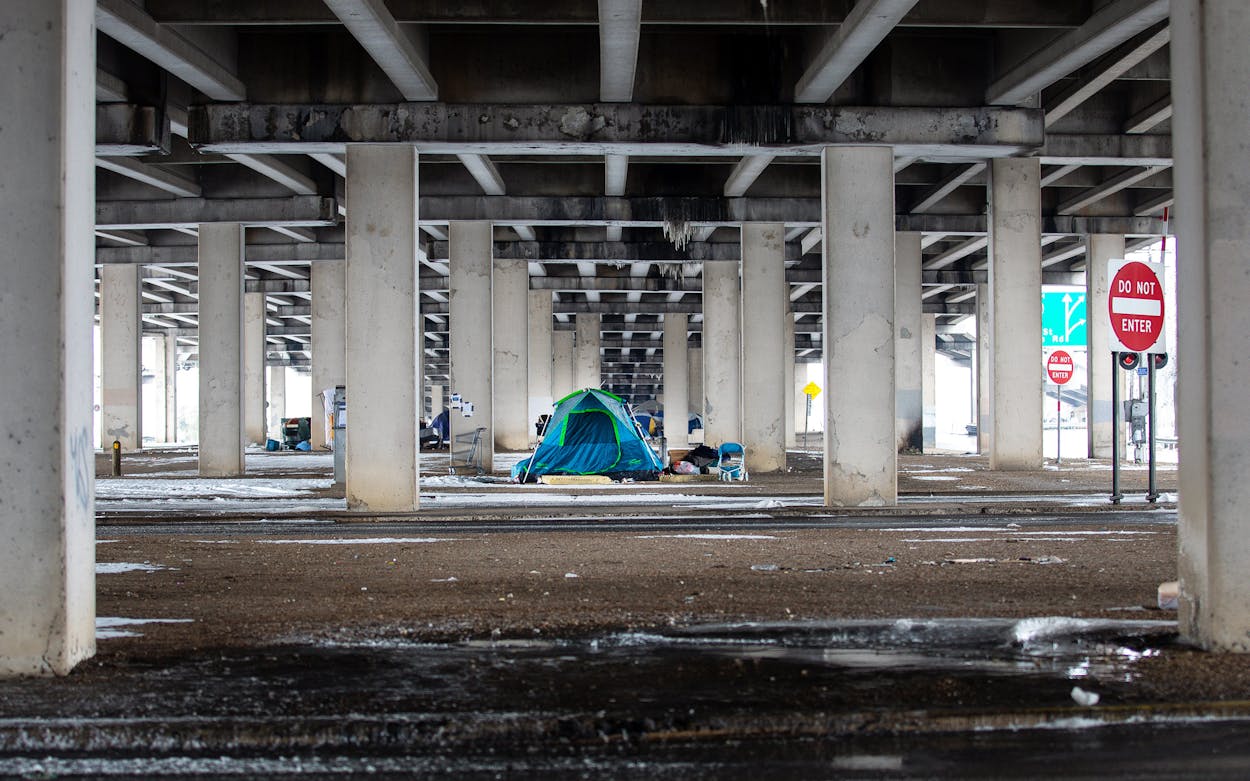Municipal elections aren’t typically the most scintillating exercises of democracy, but three local ballot propositions voted on May 1 in cities around the state are worth the notice of all Texans. Austinites have overwhelmingly approved Proposition B, which restores a public camping ban, outlawing the homeless from putting up shelter in places not designated by the city. Residents of San Antonio narrowly rejected their own Proposition B, which would have eliminated collective bargaining for city police. And, in Lubbock, voters have approved Proposition A, which bans abortion within city limits.
Let’s start with Austin. Until 2019, the city, like many in the country, managed the problem of homelessness by criminalizing behavior such as sitting or lying on sidewalks, effectively allowing cops to issue tickets and low-level charges for simply being homeless in public places. Advocates felt this was inhumane: some homeless Austinites racked up dozens of citations, along with mounting fees and a criminal record, which made it harder for them to escape their circumstances. In 2019, the city council nullified a ban on camping along with two other ordinances most often used to ticket the homeless.
This was a pretty audacious experiment, testing both how to address homelessness and how the public would react. Repealing the ban made life better for the homeless overnight, many say, but it also made homelessness much more visible. Well-meaning Samaritans distributed tents to those on the streets, which quickly accumulated in lots and under highway overpasses. The challenge for the city council was to figure out the next step: how to proactively address the root causes of homelessness, while working to reduce the campsites downtown.
The council never did square the two, and a backlash over the repeal of the camping ban bubbled, drawing the attention of Governor Greg Abbott and other statewide officials, who lose no opportunities to pound on the capital city. Save Austin Now PAC, a group co-founded by the chairman of the Travis County GOP and a Democratic party activist, and led by the president of the city’s police union, succeeded in putting the issue on the ballot this May.
On Saturday, voters handed the city council a stinging rebuke, voting to reinstate the camping ban by a 57–43 margin. Many will claim the vote is also a rebuke of Mayor Steve Adler, who supported the repeal of the ban in 2019. But it is not hard to imagine that Adler is secretly relieved to have the matter settled for him—he no longer has to defend a policy that constituents increasingly gave him grief over.
The real losers of the vote are the homeless themselves. For a few years unhoused people in Austin could sleep with less fear of being assaulted or drowned in a flash flood. Now they must vacate camps and may be pushed to less trafficked—and less safe—areas. Back to status quo.
In San Antonio, activists with Fix SAPD, a group formed in the midst of last summer’s protests against police violence, tried to take on the city’s powerful police union. They drafted Proposition B, which would have removed the right of police officers’ union to collectively bargain with the city to determine the San Antonio Police Department’s contract. Instead, the city would use a “meet and confer” model that other municipalities in Texas, including Austin and Dallas, use. Collective bargaining results in a binding contract; meet and confer gives more leverage to the city.
Taking on the police union, supporters of Prop B argued, would be an effective way of holding police accountable. By eliminating the ability of officers to collectively bargain, the city could insist on terms ensuring more oversight and accountability for the force, which has come under increased scrutiny in recent years. (Notably, 27 out of 40 officers fired from SAPD for misconduct in the last decade were reinstated following arbitration hearings that the city’s contract guarantees.) Critics, including Abbott, argued the proposition was tantamount to “defunding the police,” and would result in officers receiving reduced benefits.
The proposition won support from former mayor Julián Castro and Spurs coach Gregg Popovich. But it failed by a 51–49 vote. A loss, but the kind of loss that might make supporters wonder if a similar measure might pass in the near future.
Lubbock, meanwhile, with a population of more than 250,000, has become the nation’s largest “sanctuary city for the unborn”—which is to say it has banned abortion in city limits. Other cities in Texas, including Naples and Waskom, have already implemented bans, but Lubbock is the first with an abortion provider within city limits to pass such a ballot proposition. (There’s a Planned Parenthood clinic near Texas Tech University.)
In addition to pro-choice advocates, some Republicans in city government opposed the proposition, questioning whether a city could outlaw the procedure. When it goes into effect, Lubbock’s ban, which passed by a 62–38 margin, will almost certainly prompt a legal challenge that will cost the city money.
Many experts say it’s likely unconstitutional. But it is perhaps hard to anticipate how the courts at present—including, potentially, the Supreme Court—would treat Lubbock’s law. For that reason, expect more Texas cities to try to follow Lubbock’s path.








